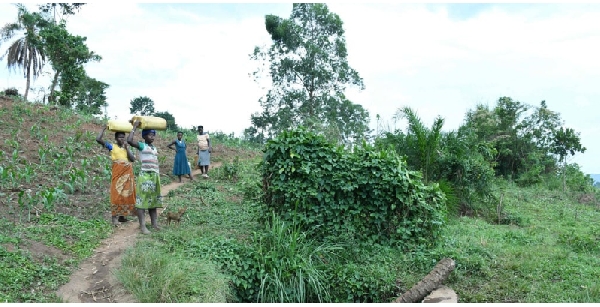
KAMPALA, March 26 (NNN-AGENCIES) — At least 1,000 residents across Uganda’s Kiikuuta Village in Kakabara Sub-county, Kyegegwa District, are celebrating after finally getting a clean and protected water source for the first time in 90 years.
The residents, who have inhabited the area since before the country’s 1962 independence, said “for generations, they have relied on water collected from runoffs along the roadside or endured over 15km-journeys to reach the Nyakabiso River.”
Over the last century, residents have endured the burden of waterborne diseases such as diarrhoea and typhoid due to the lack of access to safe water, according to local authorities.
Sixty-year-old Kikuuta Village resident Joseph Bareekye told Monitor that “majority of his village mates lived and died without ever accessing safe water.”
“All that we use for our domestic needs is contaminated water. Those who can afford use boda-bodas or bicycles to fetch water from nearby streams for Shs1,000 per jerrycan. For those of us who can’t afford it, we resort to either sharing water with animals or relying solely on rainwater,” he remarked on Saturday.
Now, residents like Wilbroad Rubaramira say they are optimistic “they will no longer have to spend money on treatment, as a new clean water source promises to improve their health and well-being.”
“I have told my people that we must protect it to see that it can serve us for more than 20 years, leaders have ignored us for years,” he reacted a day after a new borehole was commissioned in the area on Friday.
Residents of Kikuuta Cell in Kyegegwa District gather on March 22, 2024 at the commissioning of a borehole, the village’s first clean water source in over 90 years.
Authorities say the Shs6.6 million clean water project was enabled by MTN Foundation Uganda under the Change Makers program in partnership with Soul Rescue Mission.
Kyegegwa District Assistant Water Officer, Sarah Nakachwa decried little government funding.
“The district receives little funding and cannot extend water to all villages. We have a window for all development partners to come to work with the district,” she said.
She added: “Also, our plan for next year’s financial year is to construct one water source point in this area. We are now looking for a place where we can establish it.”
According to data from the Ministry of Water and Environment, the overall access to safe water in Kyegegwa District is at 30 per cent, with rural areas at 29 per cent and urban areas at 48 per cent.
The district currently has 661 domestic water points, serving a significant portion of the population in rural areas. However, a concerning statistic reveals that a total of 131 water points have been non-functional for over 5 years and are considered abandoned.
In terms of specific sub-counties, access to safe water varies: Hapuuyo sub-county stands at 55 percent, Kabweeza-Kyegegwa at 31 per cent, Kakabara at 27 per cent, Kasule at 36 per cent, Kyegegwa Town Council at 48 per cent, Mpara at 33 per cent, Rwentuha at 21 per cent, and Ruyonza at 20 per cent. — NNN-AGENCIES




